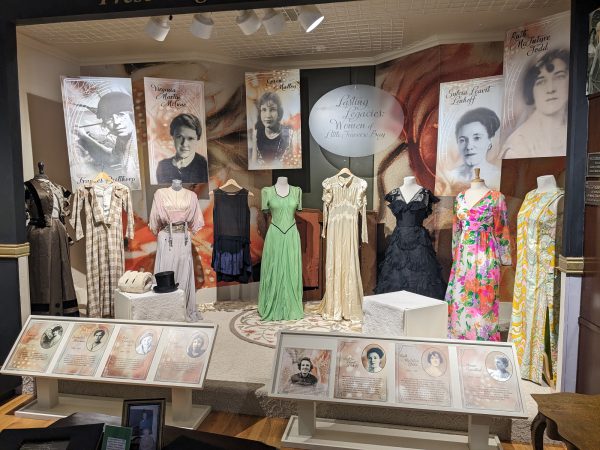

Online Presentation
Claire Mullins ’26 worked as an intern with the Little Traverse Historical Museum this summer, researching and installing the display “A Century of Fashion.” Claire’s online presentation on October 26 discussed her work via Zoom.
Kalamazoo College student Claire Mullins ’26 told a Zoom audience about her summer internship while sharing her research on the history of northern Michigan fashion on Thursday, October 26.
During the online event, sponsored by North Central Michigan College, Mullins detailed an exhibit of her creation titled A Century of Fashion, which is now on display at the Little Traverse Historical Society in Petoskey. The exhibit includes about 10 dresses that were donated to the society’s museum over the years along with educational storyboards she drafted while working with a clothing and costume historian. Her presentation went over each time period the dresses are from, what they’re made of, and why they would be worn.
“I want to work for a big museum or on archeological digs one day, so I’m hoping a presentation like this can show I have museum experience and that I already know how to use some museum software while putting on a display like this,” Mullins said. “I also hope the presentation will not only lead to awareness of the Little Traverse Historical Society, but maybe lead to some visits and draw some donations.”
Mullins, a classics major, said she developed a passion for fashion when she visited the Smithsonian in Washington, D.C., and saw the dresses that First Ladies have worn over the years. However, she wasn’t necessarily thinking about fashion when she sought an internship through Handshake, the College’s platform for jobs and internships. She was more concerned about finding an opportunity close to her Lewiston, Michigan, home, leading her to the Little Traverse Historical Society. There, Mullins interviewed with Executive Director Jane Garver, whose daughter, Grace, graduated from K this year.




“Our K connection helped in the interview, but I told her I was interested in history and that I wanted to specifically work at a museum,” Mullins said. “It went really well, we talked about K a lot, and when she called me back, she told me I got the job.”
Mullins started the internship by archiving some of the historical society’s collections in an online database until Garver mentioned that most of her interns undertake a project of their own choosing. About that time, Mullins visited her employer’s storage unit, where she found racks upon racks of clothing, dresses in particular.
With changing membership and management, along with a flooded old house that formerly served as a storage area, most of the items were undocumented, so Mullins took it upon herself to catalog as much as possible while arranging an on-display exhibit.
To secure her full exhibit, Mullins even went as far as donning personal protective equipment (PPE) to sift through a crawlspace once used for storage that contractors had haphazardly filled with spray insulation. That search—despite a frightening experience involving a mannequin arm suddenly appearing from under the insulation—proved to be fruitful: She found a 1953 Harvey Berin couture dress, custom made by hand in New York City and valued at more than $4,000.
“It wasn’t in our online database, which was the only way we could figure out where a lot of this stuff came from,” Mullins said. “Much of it was donated in the 90s and it wasn’t put in the computer system correctly. A lot of times, the person whose name was on it wasn’t even the person who donated it, so I’m also hoping that the presentation might lead someone to say, ‘My gosh, I remember my grandma wearing that dress,’ or ‘I think my mother wore that one time,”’so we can include that.”
